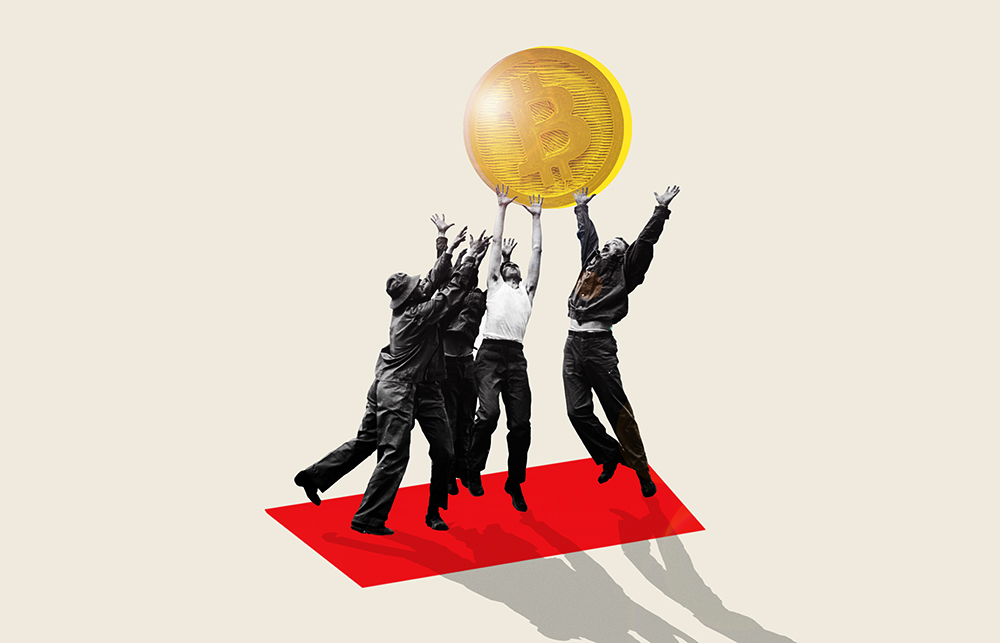
我经营一个线上平台,专门帮助人们买卖数字资产,比如比特币和其他加密货币。2016年,我对这个行业还知之甚少,如今我的平台已经成为美国最重要的数字资产交易平台之一。我亲眼见证了人们对于加密货币的认识的变化。
在大多数情况下,加密货币的世界都是一个陌生的领域,仅局限于Twitter和Telegram里的私聊。但2020年在新冠疫情期间,人们对加密货币的兴趣激增。无论是TikTok用户在视频里为狗狗币(DogeCoin)摇旗呐喊,还是一位二十多岁的黑客攻击Twitter大V账号索要比特币,在2020年,从青少年到耄耋老人或许都会对加密货币和数字货币有所了解。
有几个重要因素导致了这种变化。首先,政府向个人和企业发放补贴,这削弱了美国法定货币(实物现金)体系。第二,摩根大通(JPMorgan Chase)等大型银行机构允许甚至欢迎数字货币加入他们的平台。第三,更多美国人待在家中,见证了股市增长和美国失业率趋势的差异。
美元疲软
随着多场体育赛事和大型活动被取消,同时许多美国人正在接受政府补助,这让许多美国人被动见证了金融领域的变化。虽然我们认为理所当然的大部分事情已经停滞,但有两件事没有变化,它们就是互联网和货币兑换。
发生显著变化的是货币的价值,尤其是美元的价值。美国人继续领取公共财政援助,企业继续利用薪资保护计划(Payroll Protection Program, PPP)的贷款,导致美元的固有价值持续下降。本周早些时候,美元指数公布的美元价值跌至2018年5月以来的最低水平。
这意味着什么?更多人会通过投资美元以外的货币多方下注,购买其他法定货币。然而,我们也会看到越来越多的人投资加密货币:甚至有人在收到政府刺激计划初期发放的补贴之后,在几周内存入了1,200美元购买加密货币。
银行的推动
过去十年业绩最好的资产并不是亚马逊(Amazon)、苹果(Apple)、微软(Microsoft)的股票,房地产投资信托基金(REIT)或者房地产,而是比特币。这种业绩最佳的资产却并不在传统银行模式当中,这引起了银行的关注。
5月,美国最大的零售银行、一直坚决反对比特币的摩根大通宣布,其平台已经开始办理加密货币交易,并计划推出一种与美元挂钩的数字货币摩根币(JPM Coin),用于加快全球支付转账的速度。6月,CoinDesk报道称PayPal和Venmo可能直接销售加密货币,进军加密货币领域。8月初,高盛(Goldman Sachs)新聘请了一位数字资产负责人,负责扩大加密货币业务的规模。
加密货币最早只在游戏玩家、程序员和科技行业早期的百万富翁中流行,如今更多人有机会参与到这种替代系统当中,从而对自己的财富拥有更大的控制权。任何人只要有智能手机就可以使用加密货币,不需要等到银行开门或者借记卡寄到手中。而且加密货币是去中心化的资产,使用公共账簿以符号记录每一笔支付,因此加密货币的透明度,可能是政府救助项目所无法企及的。
实际财富与股市脱节
许多美国人仍没有工作,他们感受到了股市的成功和个人财务现状之间的脱节。金融系统到底是在帮助我们还是在伤害我们?进入加密货币领域的新人,从保罗•都铎•琼斯到威廉•沙特纳再到奥运金牌得主克里斯蒂•兰彭,他们正在帮助发起一场探讨这个问题的坦诚对话。
这些人的加入非常重要,因为他们向所有人证明加密货币和数字货币是真实存在的。由于比特币的创始人无人知晓,因此加密货币领域不太可能出现如同著名橄榄球运动员汤姆•布雷迪这样的人物,但所有讨论加密货币和数字资产的人都在帮助证明这个行业的价值。由于加密货币和比特币是去中心化的资产,没有一家治理机构,因此全世界有无数热心人一直在努力完善对数字资产的访问权限。我预计,很快会有更多人为加密货币和数字资产背书,因为它们的重要意义和好处会让人难以拒绝。
比特币的未来
无论你是否听说过比特币,这个词和它所代表的概念永远不会消失。哈佛大学(Harvard)、斯坦福大学(Stanford)和麻省理工学院(MIT)等知名高校的捐赠基金都投资加密货币基金是有原因的。
加密货币的可信度在不断提高。如果出于好奇,不妨研究一下比特币和数字资产,看看其他人都在怎么说。毕竟,在我们居家隔离期间,加密货币会继续升温,这是一个可靠的迹象,证明无论是否存在疫情,加密货币都将是人类未来的重要一环。(财富中文网)
本文作者凯瑟琳•科利为Binance.US公司CEO。
译者:Biz
我经营一个线上平台,专门帮助人们买卖数字资产,比如比特币和其他加密货币。2016年,我对这个行业还知之甚少,如今我的平台已经成为美国最重要的数字资产交易平台之一。我亲眼见证了人们对于加密货币的认识的变化。
在大多数情况下,加密货币的世界都是一个陌生的领域,仅局限于Twitter和Telegram里的私聊。但2020年在新冠疫情期间,人们对加密货币的兴趣激增。无论是TikTok用户在视频里为狗狗币(DogeCoin)摇旗呐喊,还是一位二十多岁的黑客攻击Twitter大V账号索要比特币,在2020年,从青少年到耄耋老人或许都会对加密货币和数字货币有所了解。
有几个重要因素导致了这种变化。首先,政府向个人和企业发放补贴,这削弱了美国法定货币(实物现金)体系。第二,摩根大通(JPMorgan Chase)等大型银行机构允许甚至欢迎数字货币加入他们的平台。第三,更多美国人待在家中,见证了股市增长和美国失业率趋势的差异。
美元疲软
随着多场体育赛事和大型活动被取消,同时许多美国人正在接受政府补助,这让许多美国人被动见证了金融领域的变化。虽然我们认为理所当然的大部分事情已经停滞,但有两件事没有变化,它们就是互联网和货币兑换。
发生显著变化的是货币的价值,尤其是美元的价值。美国人继续领取公共财政援助,企业继续利用薪资保护计划(Payroll Protection Program, PPP)的贷款,导致美元的固有价值持续下降。本周早些时候,美元指数公布的美元价值跌至2018年5月以来的最低水平。
这意味着什么?更多人会通过投资美元以外的货币多方下注,购买其他法定货币。然而,我们也会看到越来越多的人投资加密货币:甚至有人在收到政府刺激计划初期发放的补贴之后,在几周内存入了1,200美元购买加密货币。
银行的推动
过去十年业绩最好的资产并不是亚马逊(Amazon)、苹果(Apple)、微软(Microsoft)的股票,房地产投资信托基金(REIT)或者房地产,而是比特币。这种业绩最佳的资产却并不在传统银行模式当中,这引起了银行的关注。
5月,美国最大的零售银行、一直坚决反对比特币的摩根大通宣布,其平台已经开始办理加密货币交易,并计划推出一种与美元挂钩的数字货币摩根币(JPM Coin),用于加快全球支付转账的速度。6月,CoinDesk报道称PayPal和Venmo可能直接销售加密货币,进军加密货币领域。8月初,高盛(Goldman Sachs)新聘请了一位数字资产负责人,负责扩大加密货币业务的规模。
加密货币最早只在游戏玩家、程序员和科技行业早期的百万富翁中流行,如今更多人有机会参与到这种替代系统当中,从而对自己的财富拥有更大的控制权。任何人只要有智能手机就可以使用加密货币,不需要等到银行开门或者借记卡寄到手中。而且加密货币是去中心化的资产,使用公共账簿以符号记录每一笔支付,因此加密货币的透明度,可能是政府救助项目所无法企及的。
实际财富与股市脱节
许多美国人仍没有工作,他们感受到了股市的成功和个人财务现状之间的脱节。金融系统到底是在帮助我们还是在伤害我们?进入加密货币领域的新人,从保罗•都铎•琼斯到威廉•沙特纳再到奥运金牌得主克里斯蒂•兰彭,他们正在帮助发起一场探讨这个问题的坦诚对话。
这些人的加入非常重要,因为他们向所有人证明加密货币和数字货币是真实存在的。由于比特币的创始人无人知晓,因此加密货币领域不太可能出现如同著名橄榄球运动员汤姆•布雷迪这样的人物,但所有讨论加密货币和数字资产的人都在帮助证明这个行业的价值。由于加密货币和比特币是去中心化的资产,没有一家治理机构,因此全世界有无数热心人一直在努力完善对数字资产的访问权限。我预计,很快会有更多人为加密货币和数字资产背书,因为它们的重要意义和好处会让人难以拒绝。
比特币的未来
无论你是否听说过比特币,这个词和它所代表的概念永远不会消失。哈佛大学(Harvard)、斯坦福大学(Stanford)和麻省理工学院(MIT)等知名高校的捐赠基金都投资加密货币基金是有原因的。
加密货币的可信度在不断提高。如果出于好奇,不妨研究一下比特币和数字资产,看看其他人都在怎么说。毕竟,在我们居家隔离期间,加密货币会继续升温,这是一个可靠的迹象,证明无论是否存在疫情,加密货币都将是人类未来的重要一环。(财富中文网)
本文作者凯瑟琳•科利为Binance.US公司CEO。
译者:Biz
I run an online platform that helps people buy and sell digital assets (like Bitcoin and other cryptocurrencies). In 2016, I knew little about the industry, and today I lead one of the foremost digital asset marketplaces in the U.S. I’m evidence that anyone can learn about crypto.
For the most part, the world of crypto has operated in a strange lane all by itself, confined to Twitter and Telegram private chats. But in 2020—amid the coronavirus pandemic—interest in crypto has boomed. Whether it's been TikTok cheering on DogeCoin or a twenty-something hacking into high-profile Twitter accounts and asking for Bitcoin, 2020 might just be the year everyone from teens to nonagenarians learns about cryptocurrencies and digital money.
There are a few factors contributing to this change, and they are important enough that Americans should be paying attention. First, government payments to individuals and businesses alike are weakening the U.S. fiat (physical cash) system. Second, large banking institutions like JPMorgan Chase are condoning and even welcoming digital currencies onto their platforms. And third, more Americans are home, witnessing the discrepancy in the market’s growth and the nation’s unemployment rate.
The weakening dollar
With numerous sports and large events canceled, and many Americans receiving government aid, the U.S. has a captive audience for financial change. While most things we took for granted have halted, two things have stayed the same: the Internet and the exchange of money.
What has changed notably is the value of money, in particular the U.S. dollar. As Americans continue to receive public financial assistance and businesses utilize Payroll Protection Program (PPP) loans, the inherent value of the dollar is dropping. Earlier this week, the U.S. Dollar Index reported that the value of the dollar dropped to its lowest level since May 2018.
What does this mean? More people will hedge their bets on currencies that act outside the confines of the dollar and buy other fiat currencies. However, we are also seeing more people invest in cryptocurrencies: Some even had an influx of exact deposits of $1,200 in the weeks after initial stimulus checks were received.
Bank momentum
The best performing asset of the last decade was not Amazon, Apple, Microsoft, real estate investment trusts (REIT), or real estate—it was Bitcoin. When the best performing asset doesn’t even exist in traditional banking models, banks get interested.
In May, the largest retail bank in America, JPMorgan, which has historically been a staunch opponent of Bitcoin, announced it is already processing crypto transactions on its platforms, and has plans to create JPM Coin, a digital currency tied to the dollar, that would expedite global payment transfers. In June, CoinDesk reported that PayPal and Venmo might be joining the crypto community by offering direct sales of cryptocurrencies. Earlier in August, we saw Goldman Sachs bring in a new head of digital assets to scale up its crypto operations.
Crypto—once reserved for the gamers, coders, and early tech millionaires—is now a place where more people have the opportunity to participate in an alternative system where they can have more control over their wealth. Anyone with a smartphone can access crypto without waiting for banks to open up or for a debit card to be mailed to them. What's more, because crypto is decentralized and uses a public ledger to notate payments, there is an opportunity for a level of transparency government assistance programs do not provide.
Disconnect between actual wealth and the stock market
Many Americans remain unemployed and feel the disconnect between the stock market’s success and the financial reality of their lives. New personalities entering the crypto world—from Paul Tudor Jones to William Shatner to Olympian Christie Rampone—are helping initiate an honest conversation about whether our financial systems are helping or hurting us all.
These names are also an important part of showing everyone that cryptocurrencies and digital currencies are real. Although there may not be a Tom Brady of crypto due to the fact that the originator of Bitcoin is anonymous, everyone who talks about cryptocurrencies and digital assets helps validate the industry. Because crypto and Bitcoin were built to be decentralized and without one governing body, there are impassioned contributors across the globe who work constantly to improve access to digital assets. I expect that soon there will be more who come forward to provide credibility to crypto and digital assets, as their relevance and benefits are unavoidable.
The future of Bitcoin
Whether or not you’ve heard of Bitcoin, it's a word and a concept that is not going anywhere. There is a reason why the most prestigious university endowments, such as those affiliated with Harvard, Stanford, and MIT, all invest in crypto funds.
Crypto is building in credibility. If for no other reason than curiosity, investigate Bitcoin and digital assets and see what everyone is talking about. After all, crypto will keep going while we are locked in our homes—a surefire sign that, pandemic or not, crypto is a huge part of our future.
Catherine Coley is CEO of Binance.US.






